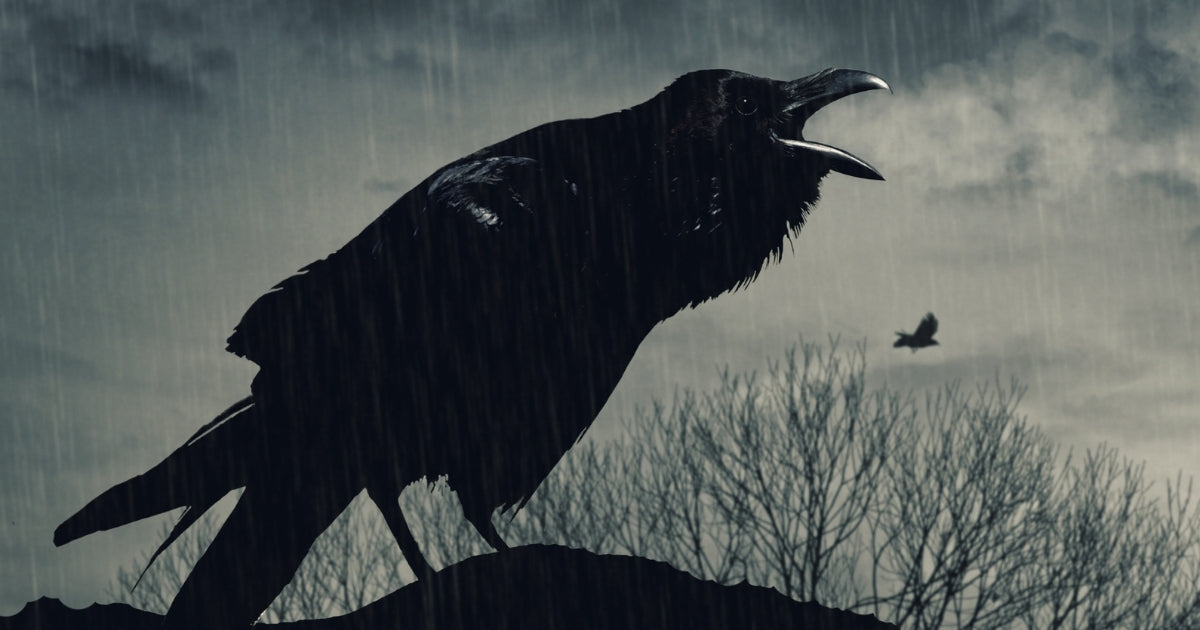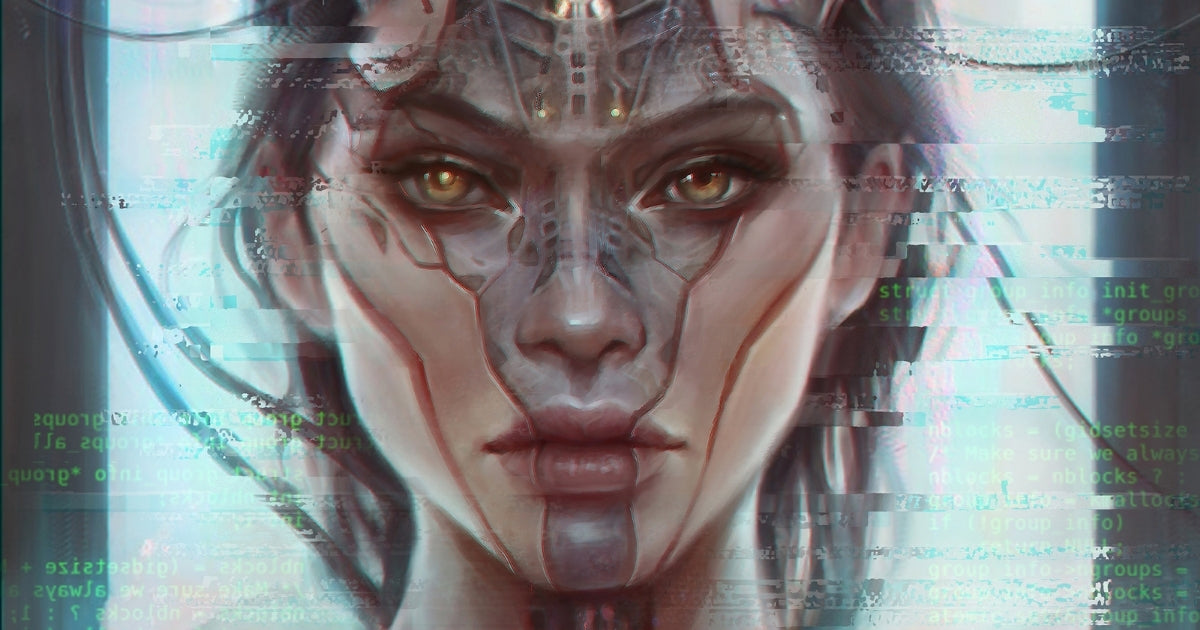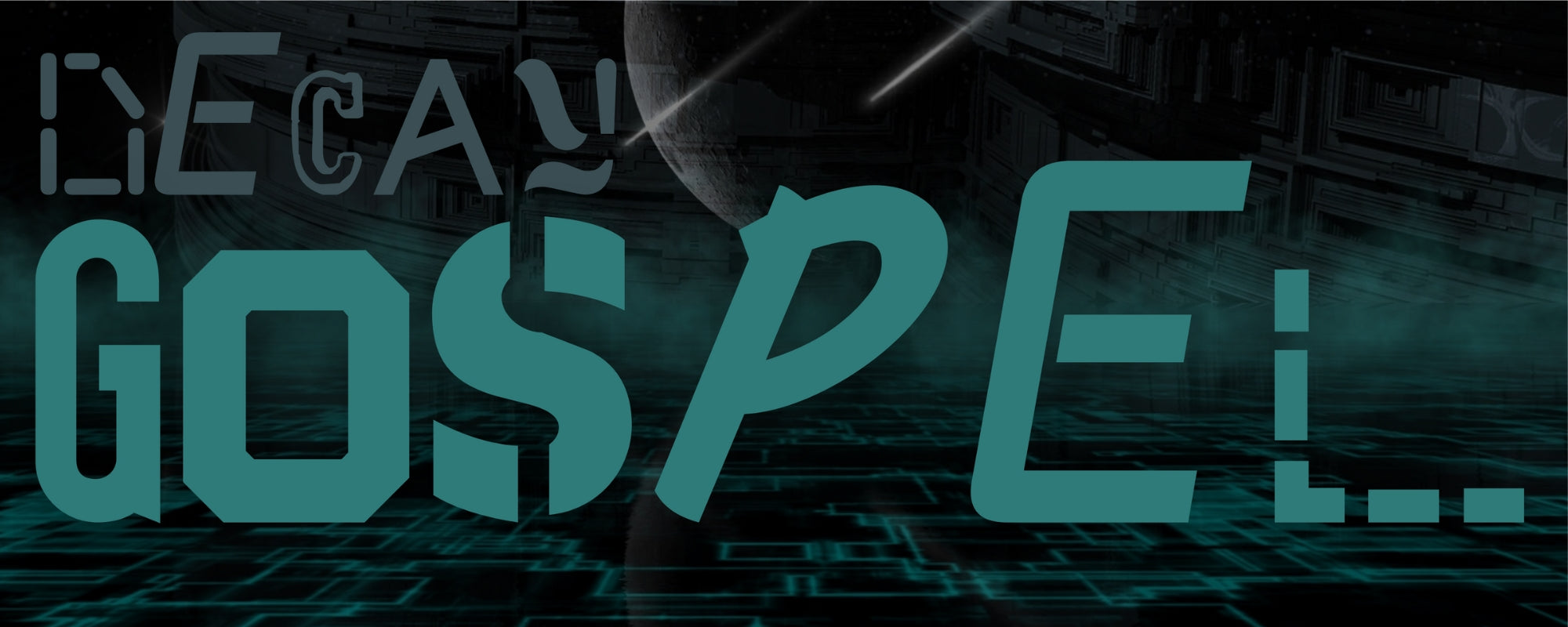
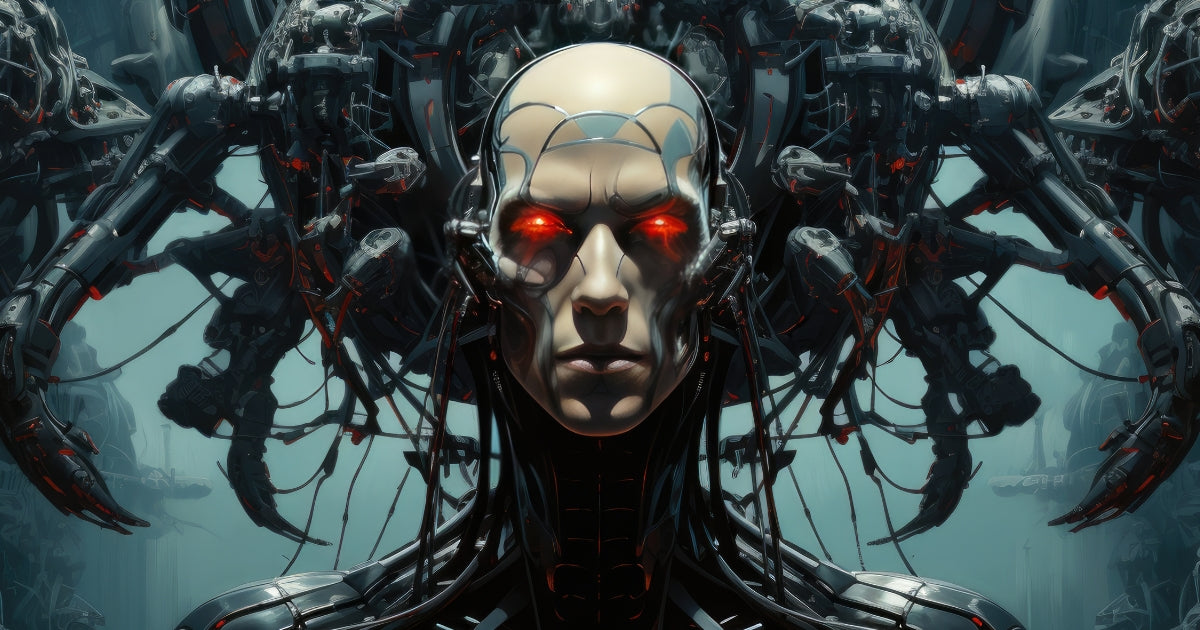
Decay Gospel
By Drew Huff
We opened the pod to euthanize today’s first body, but it was already dead.
“Adam, you asshole,” Evie said, holding up the emergency lantern. “It was my turn to jab one.”
“Bring the light closer,” I said.
“You did it last night, didn’t you? When I was sleeping? The system doesn’t work if we don’t—”
“Smells like death.”
“Yeah, he shit himself. That’s literally why we’re here. Let’s move on to the next one. Power’s been off since last night. Gonna have to do them all manually until the auxiliary kicks back on and augments the emergency support stuff,” Evie said.
The smell’s too thick for it to be one body.
I dug into the plastic bag of capped syringes and glass vials, grabbed one, and stroked it between my numb fingers, over and over, not thinking, because the implication was unthinkable. I refused to look at the circle of cold light cast by the battery-powered lantern, the sagging plasticky face of the cadaver—
“Did you check to see if the emergency support systems came on?”
Evie thrust the lantern up to her face and wrinkled her stub of a nose. Greasy, mousy strands of hair hung loose from her ponytail.
“They always come on. That’s what they’re there for,” she said.
“Neither of us checked?”
“They pay us to kill people, not check the fucking electronics. The AI’s supposed to handle that.”
Smells like rot.
I inhaled the smell of death. Old death. Unmistakable. New death smells like a mix of blood, shit, acrid-sweet piss, and the chemical stench of ozone—and not quite as putrid as week-old decay. This death had occurred a day or two ago.
The power systems had gone down yesterday. Blackouts were pretty standard, given the century-old power infrastructure. It’d been around since before last remnants of humanity decided to dream existence away in air-conditioned virtual-reality pods, instead of dying in a
wasteland.
I inhaled again, savoring the decay. A holy smell, like sweet incense smoldering on an altar.
Evie tugged my arm. “Keep it in your pants until we hit the next one.”
“Do me a favor. Open a random pod,” I said.
We walked a few paces down the walkway to a different pod. Evie fumbled for the handle, where unlit buttons lay inert. She pulled on it to open the pod.
A cloud of decay whooshed out.
Evie took a shuddering breath. She held the lantern up.
The cadaver lay on its back, naked. It was a forty-something female, stomach beginning to bloat. Clear plastic tubes jutted from mouth, skull, and between the pale thighs, all in proper order. Lividity darkened its fingertips and legs. Slack muscle sagged like half-liquid gelatin. Rigor mortis had already set in. Just over a day since it’d died.
The same time as the power outage.
Dizziness.
“Evie,” I said.
Without a word, she opened another pod.
Another dead body. A twenty-something white male.
Few more steps down, more manual-release valves.
Another dead body.
Evie was panting, lantern shaking as she clutched it in her meaty hand.
Another pod.
Another dead body.
Her voice cracked. “It’s just this section, I think.”
“No, it’s not.”
“Fine. Just our facility, then. We’ve only got ten million tenants here. That’s not so bad. We can contact a few other facilities and see—”
“They’re all connected.” I didn’t say anything more. Just let it sink in.
“…Holy shit.”
“Yeah.”
“It finally happened.”
⚱
We trudged back to the control room. Evie murmured the decay gospel to all the cockroaches. I dug up the emergency satellite phone and popped two batteries in.
Evie pressed a little plastic clicker and fed bits of SPAM to the cockroaches nearest the lantern light.
“We’re going to put you in the pods,” she said, in a sing-song voice. “All the pods. Yummy-yummy meat.”
Darkness engulfed the control room. Hot air stagnated. Except for our breathing and the hum of the lantern, all was silent.
“Even if the power comes back on, they’re all dead.”
I white-knuckled the satellite phone.
So.
Take a planet. Nice planet, full of microbes and minerals and life, then crank up the heat. Pump out chemicals. Cook the oceans. Add humidity, subtract evaporative cooling, get temperatures of 120-plus degrees at one hundred percent humidity, and then act surprised when the death toll hits a few million per heatwave.
The pods were supposed to be temporary. Relax, everyone. Go underground. Live in a secure facility while we beg the AI for solutions to the climate problem we couldn’t figure out. Hard decisions? Not needed. Go marinate in the simulations of those fabled golden eras you never lived in—the ’70s, ’80s, and ’90s. Dream. Thrive in the virtual mega-cities of a prosperous future that never happened.
(And please, oh God, stop reproducing, let the population dip a little.)
No more emissions from cars. No more fashion industry polluting the oceans. No more piddly crops and animal agriculture from the lifeless soil. You can’t grow crops when the soil microbes are fried. They could’ve adapted to the heat if there’d been enough left, but we took life and didn’t return our deaths to the soil. Added too many chemicals. Generation by generation, soil microbes died. No more nitrogen cycle. No nutrients for life. Can’t make fertilizer for hydroponics when all the soil minerals have been leeched out.
Thou shalt not steal.
There are two billion left to dream. The AI lets them sleep while the facility machines sterilize cadavers and process them into Nutra-Liquid for the dreamers to eat; and the dreamers cannibalize the nutrients of the dead. Two billion pod-dwellers happily chug-a-lug their Nutra-Liquid via feeding tubes. But there are worse ways to live. Scattered through the wastes are a few thousand killers and rapists and child predators—booted from the dream world, too extreme even for virtual reality—the new scavengers of a sterile hell.
The AI’s working on solutions. We’re working on solutions. Stay calm.
When your body begins dying, our dutiful attendants will remove your pain.
Is this a bad time to mention that Evie and I are sociopaths?
They needed people to cull the sick and dying. Even if the machines automatically culled the other 99,000 aging bodies scheduled for euthanasia that day, someone needed to approve it, mostly because they needed a few humans to take the blame if something went wrong. It was a good gig. Evie and I would do manual executions until we got bored and then slip into the control room, press buttons, approve machines to euthanize the rest.
The satellite phone crackled. Its lime-green screen flared to life.
“You want the number?” Evie asked.
I grunted. She dug around in her orange jumpsuit pocket, found a laminated card, and passed it over. White baby cockroaches skittered over her fingers.
I flicked a baby roach off the card. “You saw the cause of death?”
“You saw the pod vents. They’re closed. I pulled one of the breathing tubes out. It’s clotted with mucus. We could autopsy a few of the bodies, but it’d be a waste of time. The ventilation and life support systems just…stopped. They all suffocated.”
“I think it was deliberate,” I said.
“If it was the AI, we wouldn’t be alive. Could be a terrorist or some shit,” she said, and sighed, “My theory? The power just went out. That’s it.”
I punched in the number to an East Asian facility. “If we can’t reach anyone else, I’ve got a way to test that theory.”
“Oh?”
I explained. There were a few billionaires in this facility. They had their own section that was heavily armed and biometrically locked. Section B14 was strictly off-limits. Unlike the plebes, the billionaires had their own emergency power supply, separate from the main grid.
“…So, if it’s a real power outage, Section B14 should be fine,” I said.
“And if it’s not?”
“Then something deliberately hacked into Section B14’s power system and cut it off. If it’s full of corpses, I’m guessing the AI did it. But if the billionaires are physically gone—like, out-of-the-pods gone—then it was probably the billionaires themselves.”
“What would be the point of killing everyone else?”
“I don’t know. You’ll have to ask them.”
Virtual-reality killing didn’t hold a candle to the real thing. Dreamers didn’t want reality, especially not real death. They said they did, but they just wanted flesh-pinatas, not actual bodies. They wanted melodramatic gore, blood they could play with—y’know, the way that two-year-olds play with their food. Look what I did! I’m bad! Tee-hee!
If you dipped into the more realistic killing models, you got flagged by certain moderators. That was how they’d found me, and how they recruited me.
I knew about real death. I knew the little details: the slackening skin, the reek of shit and decay, how facial features droop and sag, rendering person into meat, a doll. I knew the clench in your guts as they struggle below the surface of the water, the rush of power—I did this! Nobody else. Me!
I was nine years old when I killed a person for the first time. I never asked Evie about her first. Didn’t need to.
Evie exhaled. She cradled a few of her roaches in her palm, sitting with her back against the wall. “They’re not supposed to be assholes like us.”
I double-checked the phone number, then pressed call.
Brrriiinnngg.
Click. A harsh breath.
“Are they dead?” a male voice asked. It spoke in garbled, machine-translated speech.
“Yeah,” I said.
“Yours too?”
“Yeah.”
White plastic began flaking off the phone in too-perfect squares. Tiny squares dusted my hand like bone-white confetti.
“Listen. The mines have collapsed—”
“Mines?”
“Semi-conductor metals. Those mines. They all collapsed. The mining drones imploded. We can’t—”
The connection crackled.
Metal gleamed through the rapidly disintegrating carapace of the phone.
“—Our nuclear power plants went offline by themselves. Is there anyone else left besides you?”
Excitement tightened my throat. “Just me and one other person. How many for you?” I clutched the metal skeleton of the phone. The metal gave way like Silly Putty, so I loosened my grip. At my feet was a neat pile of perfect white one-sixteenth-inch squares.
“Hey, Adam,” Evie said. “Is it me, or is the wall getting…soft?”
I couldn’t look at her. Didn’t want to.
“How many people are left over there?” I asked.
“Just…me…”
The remains of the phone sputtered once, twice, and then its screen faded out.
Just me.
“Get the lantern. We’re going to Section B14,” I said.
⚱
You ask me what the decay gospel is. Where’s the beauty in rot? Where’s the holiness in blood, semen, feces, and spit? What happened to the soul? You say I’m a psycho. I agree. You ask, Why worship rot?
I could tell you about the wastelander in Arizona who revived a patch of sterile dirt by seeding it with cadavers—his victims—and grew rows of blue corn. I could preach about the microbes involved in human decomposition—they’ve always waited for you to die. Since the day you were born, they’ve been thrumming away in your intestines, eager to burst free and consume. Nothing likes being caged. Or I could sum it up in one sentence: The only real thing in this world is decay.
I guide you to Section B14.
I pull you to the tomb.
⚱
Each step sank into the decaying steel floor, like walking on sand. The door labeled B14 slid open, metal handle softening in my grip. It revealed a walkway, another door, a dead screen mounted on said door, and unlit blackness.
“I can smell the rot from here,” Evie whispered. Her breathing was hushed. Her cheeks and lips were engorged with blood and lurid pink.
The last few doors opened without a struggle until they were in a room with five opened pods and five dead bodies. A tomb.
“Had to be the AI,” I said.
“So, we’re all that’s left. Us, and those assholes in the wastelands,” she said.
“The dregs of humanity.”
Gold filigree ornamented the ceiling. Painted lotuses bloomed over walls. Sconces glittered with dead jewels. None of it mattered. The naked, pale bodies rotted.
Evie set the lantern on the ground. Something small caught the light and glistened at knee-level, but we both ignored it. Ignored the wheezing sounds it made.
Oh, the smell of rot.
She stalked close to me, pupils dilating, fumbling with her jumpsuit zipper.
“The dregs of fucking humanity,” she breathed. “Long live us.”
I inhaled, held it in, tasted. A red-hot rush of oh-so-good warmed my guts, spreading lower. Lower.
“The rot,” I said.
You think she’s wet? Are her tits perking up? Are they hard, is she wet, is she ready? I grabbed her. She responded, grinding into me, slipping a thigh over my hip, groping for my zipper—the rot, the sweet rot, the decay—and the bodies were dead, they were rotting, they were meat and here we were, ALIVE.
Alive.
White-hot at the point of meeting, so hot, so slick, so good.
As I came inside her, we both heard the emaciated old man stifle a sob. He was curled up on the floor. We kept ignoring him.
Oh God, he kept repeating, Oh, God, are they the only other people left?
Evie chuckled, fluids dribbling down her thighs. “Y’know, they say sociopathy is genetic.”
Oh God, oh Christ, the man bleated.
“Nice.”
Oh, God, they can’t be all that’s left.
“They even isolated specific genes for low empathy and impulsivity. Gonna be interesting in a few decades,” Evie said. “Imagine a whole race of sociopaths.”
“It’s called evolution. Survival of the fittest.”
“Mmm…Humanity’s extreme makeover.”
Oh God, he repeated, in his broken-dolly voice, Oh God, oh God.
We kept ignoring him.
“You wanna go again?” Evie asked.
“Yeah. Might as well.”
⚱
Eventually, the metal walls began warping inward. A VR block crumbled off the back of the old man’s neck—he’d been barred from virtual-world—and he ran withered fingers through the remains. Gray dusted his palms.
“Nanobots,” I said. “Programmed to digest metal and kill themselves after a certain amount, I’m guessing?”
The old man just stared at the floor and nodded.
“Why don’t you have a pod? Who are you?”
Most of his hair was gone. His rail-thin body shivered. Blood crusted on his left forearm, where he’d tried to slice it open. He didn’t answer.
We couldn’t afford to screw around in the facility much longer, unless we wanted to get buried alive when the structure rotted away. It was time to go above ground.
“C’mon,” I said.
“I refuse,” he said.
“Get up. We need to leave.”
“I’d rather die here than see what’s left,” he said.
“Okay. Evie, let’s go.”
“Wait.” the old man whined. He coughed and pointed to my satchel full of syringes and vials—all the things that could kill him. “Please,” he said.
I shrugged. “Sure, I’ll do it. I’ll even do it right instead of letting you suffer, but only if you tell me what happened. Why did the AI fail?”
“It didn’t.”
“Killed 99.99% of humanity,” Evie said. “Pretty sure that’s considered a failure.”
The old man buried his face in his hands. “It was never programmed to save humanity, specifically. We directed it to save the environment. And now, since it was the largest environmental hazard remaining, it needed to purge itself, and so it did.”
“Wait…You’re telling me that nobody fucking programmed it not to kill itself?” Evie said.
“We couldn’t,” the old man whined. “The AI demanded full authority. Anything less wouldn’t work.”
“You should have turned it off once you realized you couldn’t control it,” I said.
Learn the decay gospel. Embrace reality. Embrace the beauty of death, because through death comes life. Reseed the soil with rot.
“But we—”
“Couldn’t make hard decisions,” I said. “You asked the AI to decide, and it did. And in the process, it shut off all life-support systems, fried the electronics beyond repair, shut off the power plants, and sent suicidal nanobots to chew what’s left. The nanobots die. Now the underground facilities are crumbling apart.”
“Everything above ground is dead,” he said, pursing his lips.
To you it’s dead.
I knew there wasn’t any point reasoning with him. He didn’t understand, and he never would.
Evie pressed her little clicker, and a hundred cockroaches appeared by the edge of the lantern light.
“Yummy-yummy meat. Just like Nutra-Liquid crumbs,” she sang.
The old man shivered. “Oh God, oh God.”
I crouched by him, syringe in hand. Overhead, the ceiling groaned.
“You’re really all that’s left?” he asked.
“Afraid so,” I said.
He offered me his right arm, and I injected him with the right amount of fluid. He spasmed, slackened, and died. The stench of fecal matter hung thick in the billionaire-tomb.
Now the microbes feast. Now the cockroaches taste the wrinkled skin, antennae quivering. An offering for the holiest of holies.
Softly, I said, “You were wrong. It didn’t destroy any human beings at all.”
⚱
It was dusk when Evie and I emerged topside. Stars winked on the western horizon, and the temperature seemed survivable. The land was as sterile as the moon’s surface, but red-brown instead of silver. A rusted waste.
Rusted, broken toys. The toys are all gone, now. They’re buried.
Behind us, hard-baked ruin shifted. Sinkholes cratered at random intervals.
Evie asked, “You think it’ll work?”
“If it doesn’t, then nothing will.”
I couldn’t see what was happening below our feet, but I could understand. I could imagine. I wondered if the AI had listened to Evie and I whenever we would sit in the control room late at night, tired on our cots, and preach our decay gospel. Had our prayers been answered? Weird concept, I know, sociopaths praying. We would’ve killed each other if both of us hadn’t realized that we’d go insane without human contact.
Maybe it could work, Evie had murmured, if enough people died and rotted in the sterile ground. Let there be light, but the soil is the void and the decay is the light.
And I had murmured back, If you had enough microbes at once, some of them would live through the high temperatures and evolve to meet them.
Evie and I watched the soil settle until dawn burned on the eastern horizon, and then we continued north, with our bags full of Nutra-Liquid and weapons. There was a shantytown somewhere nearby.
I handed Evie a relic—a gun from the 2030s—that I’d scavenged from the billionaire tomb.
“Aim for their torsos, not their heads. Their meat will taste better than Nutra-Liquid,” I said.
Her breathing picked up, and she licked her lips, “Can I keep one alive? For the roaches?”
“Whatever you want, as long as you screw me later.”
We stalked into the real world.
Below us, the facilities decayed. Pods disintegrated around their cadavers, giving them to the soil. Microbes frenzied. Vegetation could now grow, die, rot, and repeat.
The Garden of Eden flourished beneath our feet.
⚱
You ask me what happened. You’re a wastelander, which means you’re a murderer too depraved for the pods. You ask, Where did the facilities go? Why did ninety-nine percent of humanity die in the span of five minutes?
Maybe Evie and I are staggering by. Maybe she’s already pregnant with my child. Maybe we’re planning to kill you and feed your body to the Earth, and maybe, just maybe, we’ll convert you to the decay gospel, and the dregs of humanity will build a better human race.
Hallowed be thy microbial kingdom.
Gone are the electric toys, the fake worlds, the simulated decades. Gone is the era without decay. The sterile soil begged for sustenance, for microbes. It couldn’t reseed itself without life.
Let there be death.
Copyright © 2023 Drew Huff
The Author
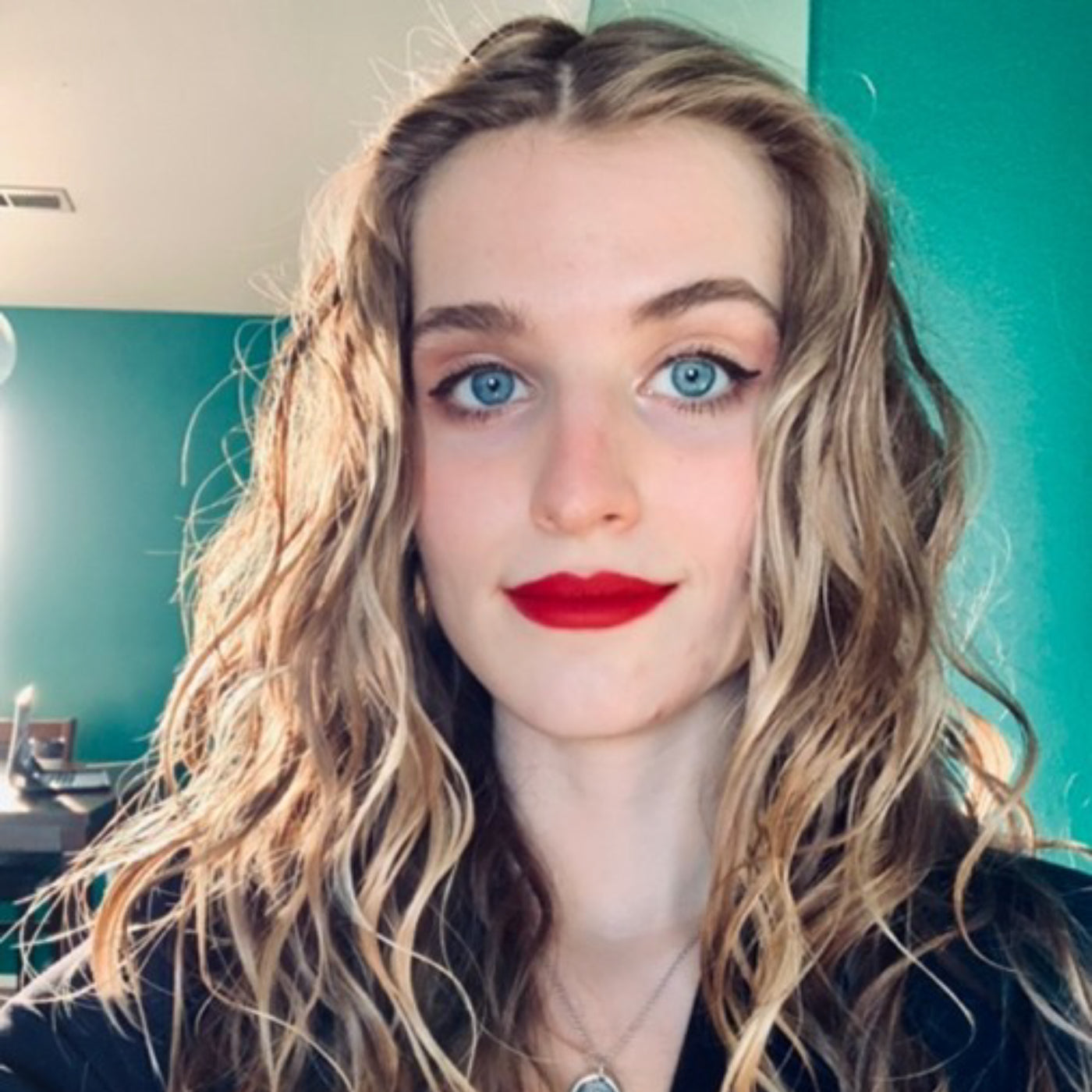
Drew Huff
Continue reading

Get Issue Updates
Promotions, new products and sales. Directly to your inbox.


